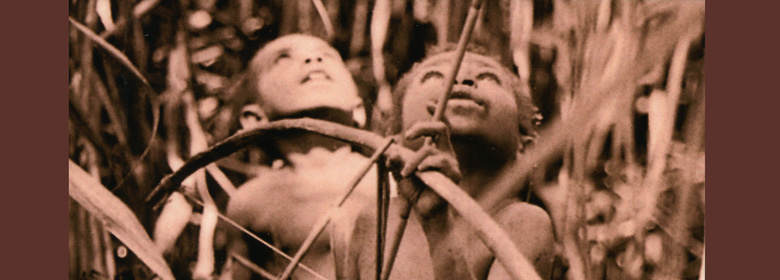Book 1. The Meeting
Chapter 1. Gwe Is Born
Eli Siegel
What is the biggest question about birth?
Arnold Perey
I don’t know.
Eli Siegel
To whom does the child belong?
— From an Aesthetic Realism Class |
Her second was
born an hour before dawn, when it was cold, in the Rainy Season. According
to custom, the child was nameless for 27 days and was secluded with her
in a birth house built in a quiet tree-covered place by her brother and
herself.
Those 27 days she
held the small being in her arms, taking turns with her sister who was
secluded with her. Thus the most vulnerable days for the infant were taken
care of, keeping the baby steadily warm in mountain weather, cold even
indoors.
Bettiana looked at
his soft skin, the color of sunny earth. She felt his fingers grasp at
her, and while he sucked milk from her breast she felt, blissfully, "The
world is so kind." Then, in the dark, her mind seemed to turn upside down,
and she remembered how insultingly her husband had ignored her opinion
in the garden. Again, he said the potatoes she was ready to harvest weren’t
big enough yet! She cradled the infant closer and thought, "But my baby
loves me." The babe seemed to reply by paddling its little arms in the
air and gurgling.
When the day of presentation
arrived, the 28th day, she brought the baby out into the world—into daylight
for the first time. Son in her arms, she presented the baby to the families
of her husband and herself, and the neighbors, who gathered at her door.
She showed the father the delicate hands and feet, refined ears, and the
baby’s private parts. Everything was perfect. The name of the person to
whom this everything belonged was Gwe.
Itulieng saw his infant
was sound—a man-baby. He felt afraid of touching it, but his thoughts were
warm: "Here is Gwe, son of Itulieng, child of the Nkuma clan." His feeling
also was, inside himself, "This baby belongs to me."
Meanwhile, Bettiana
had thought, in the dimness of the hut, when the baby was at her breast,
"Let my husband keep the older boy. Let him teach that boy to think only
of himself. Let him teach that boy not to listen to women! This
dear baby is mine!"
Outside there was
the celebratory gathering, with food. A lean woman, Gwe’s father’s sister,
laughed and slapped her friend, again and again. Gwe’s grandfather smiled
in his wiry white beard—a strong man now frail who wouldn’t live to see
the baby grow big. Men were smoking. Children were running in and out for
tree bark to make little fires and roast bits of meat. The steaming pork
was brought out of the earth-oven, unwrapped from the banana leaves, spice
ferns were picked off and munched, and at length tender sweet potatoes
were brought out of the mass. The meat was given away.
As the neighbors and
relatives took home their portions, cooked in savory herbs, to eat privately,
they felt, "This baby is ours."
Overhead, leaves were
rustling critically and the tall grass rising near the hut in a broad field
was whispering, as if to speak. It was a fine transitory sunlit hour before
the rain fell.
As Gwe became an older
boy he would sometimes stop and meditate appreciatively on the tall grass
rippling over his head in the wind. He liked its tallness when it stood
still in midday heat, and when it blossomed, and it seemed to fly plumes
at the end of high stalks, tinged with a gold light at sunset, he felt
ravished.
At such times, and
when he would see the dark irregular outline of the mountains around his
home, meeting the sky, the edge of the world would claim him: "He is mine,"
it would say, and he would hear it.
back
to top
|

